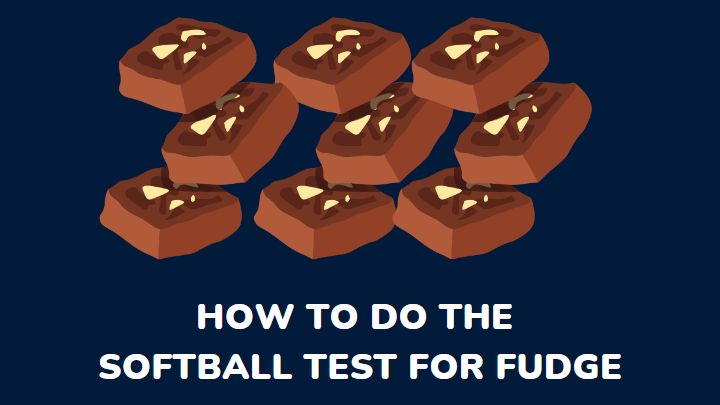Fudge is an amazing treat enjoyed by many. But regardless of the recipe, fudge goes through three stages before it becomes that delicious treat. Water and sugar are heated to the softball stage, then the ball is cooled, and stirred.
Heating sugar to the softball stage is what makes fudge creamy, smooth, and enticing. But not everyone knows how to tell that sugar and water have reached the softball stage.
If you also don’t know how to, I’ll show you in this article.
What is the softball stage?
The softball stage is an exact temperature range between 235 to 240°F when heating sugar syrup. The softball test helps to tell if sugar and water have become fudge.
When making candies like fudges and marshmallows, water and sugar are boiled to different stages to achieve the desired texture.
During the process of boiling, water releases vapor and evaporates, and the sugar concentration increases. While this happens, the boiling temperature increases.
As soon as the boiling temperature gets to 235 to 245°F, the sugar syrup is at the softball stage. At this stage, the syrup contains at least 90% sugar.
How do you test for the softball stage when making fudge?
There are basically two methods to test for the softball stage. They include:
1. Use of candy thermometer
Testing for the softball stage with a candy thermometer is pretty easy and straightforward.
Clip the thermometer by the side of the pot and bring the sugar and water to a rolling boil. But do not allow the thermometer’s knob to touch the bottom of the pot.
Allow the water to boil for 10 minutes over high heat. The water should heat up to 235 to 240°F to achieve the softball stage.
2. Cold water test
The cold water test is an old softball test method. It came before the invention of candy thermometers.
This method involves removing a spoonful of sugar syrup from the boiling pot and dropping it into a bowl of cold water to examine how it reacts.
If the syrup is able to hold its shape as a ball underwater but loses its shape outside the water, then it has reached the softball stage.
Sugar cooking stages
Sugar reacts in various ways depending on the temperature range when boiled. Also, the sugar syrup at each of these stages is used to make different types of candy and the boiling temperature required varies slightly for each of them.
1. Thread stage
The boiling temperature at the thread stage is between 215 to 235°F. At this stage, the syrup will form a thin thread in cold water. This stage is perfect when making syrups and preservatives.
2. Softball stage
The boiling temperature at this stage is between 235 to 240°F. At this point, the sugar syrup will form a small pliable ball in cold water. This stage is perfect for making fudge, fondant, and pralines.
3. Hard-ball stage
The boiling temperature in this stage ranges from 245 to 250°F. Here, a portion of the syrup put in cold water forms a firm or hard ball. The sugar is perfect for making caramel candies, marshmallows, etc.
4. Soft-crack stage
To get a soft-crack syrup the boiling temperature needed is between 270 to 290°F. The sugar syrup makes a soft cracking noise in cold water.
It also forms pliable threads which are excellent for making taffy and butterscotch.
5. Hard-crack stage
The hard-crack stage is for making candies like lollipops. Higher temperatures make sugar caramelize and brown. The boiling point for the hard-crack stage is 300°F and above. The syrup makes a loud cracking noise and forms a brittle thread in cold water.
FAQs
How long does it take fudge to boil to the softball stage?
Fudge takes about 10 to 15 minutes to get to the softball stage in high heat.
What is soft ball stage temperature in Celsius?
The softball temperature is between 112 to 115°C.
What does soft ball stage look like?
At the soft ball stage, the sugar syrup forms a small pliable ball when put in cold water.
Can you overcook fudge?
Yes. The required temperature for fudge is 235 – 240°F. You can cook sugar beyond 240°F if you want to make caramel candies and marshmallows.
Conclusion
Fudge is a creamy delight but the preparation stage is something you must pay attention to. If the sugar heats beyond the softball stage it will not form into small pliable balls in cold water.
A candy thermometer makes softball test for fudge relatively easy.
Simply clip the thermometer by the side of the pot and keep checking the thermometer till it reads 235 – 240°F. But if you don’t have a candy thermometer, then the cold water testing method is a good option too.
Thank you for reading.
Visit Millenora to read more informational food guides.

